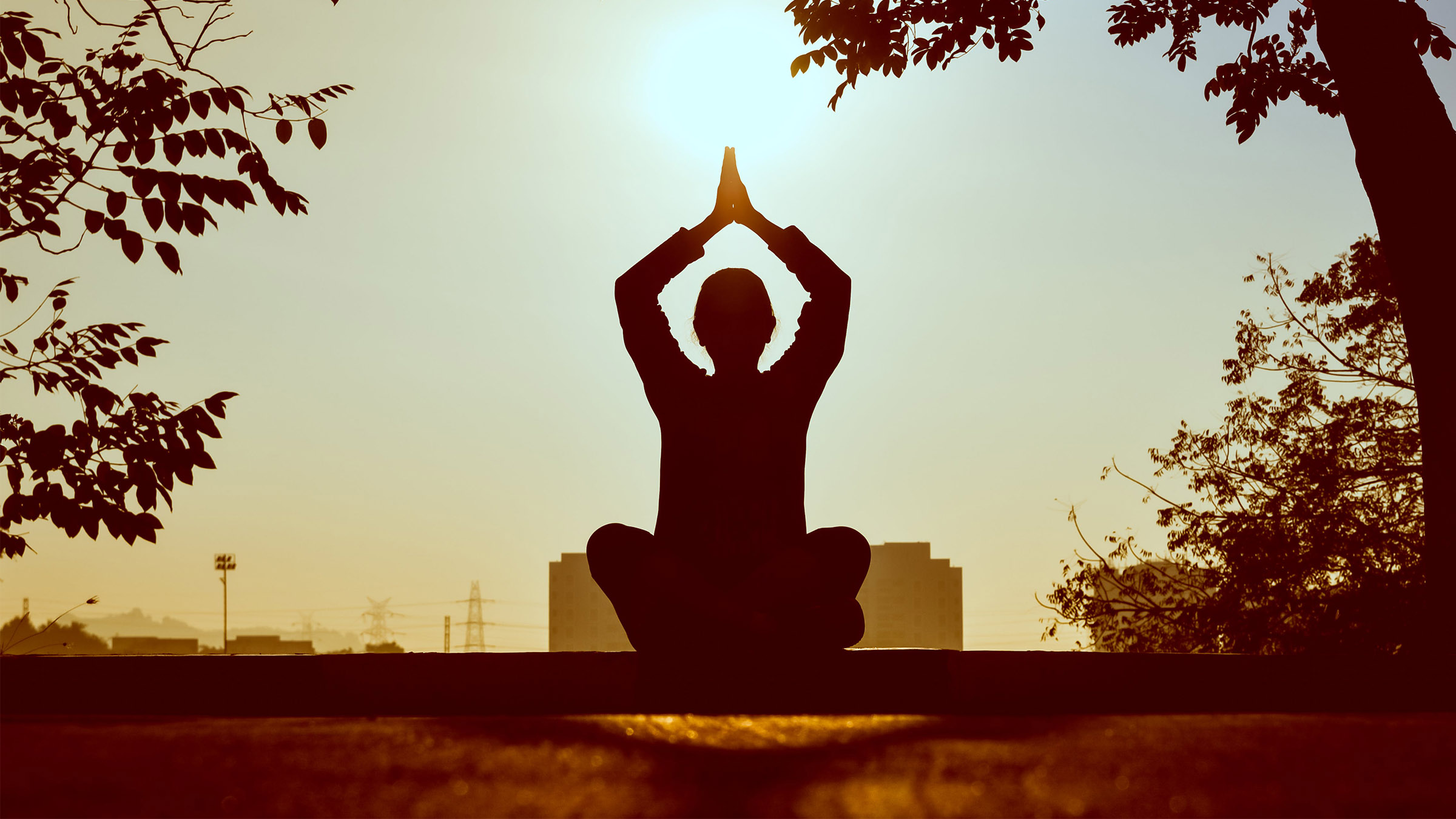Talk of “being mindful” and “living in the moment” seems to be everywhere, but between mulling over the past, worrying about the future, and getting caught up in the everyday hustle and bustle, it can be hard to truly inhabit the present moment. The easiest fix? Meditation. If you’re sceptical, know that the practice of meditation isn’t just for yogis – it’s for anyone who wants to reconnect with their inner self, become more grounded and bring more peace into their life.
To meditate effectively, you don’t need to master tricky yoga poses, sit for hours in total silence, or disappear into yourself. These five-minute-or-less meditation sessions offer simple ways to centre yourself in the here and now, helping you banish stress and stay grounded and calm wherever, whenever. And when we say ‘wherever, whenever’, we really mean it. You’re out of excuses.
The Confidence Meditation
Whether prepping for a job interview, presenting to the boss, or even just waiting for someone important to respond to a text, external situations often open our minds to self-judgement and self-criticism, which can manifest in anxiety and lower self-esteem. The good news is that only five minutes of visualisation and awareness might provide an instant and highly effective confidence booster. This meditation helps you breathe in a more powerful inner strength and breathe out any self-doubt. You’ll become aware of the external forces that make you feel negative about yourself, and you’ll learn to shift into a kinder, calmer state of mind.
The Mealtime Meditation
They say digestion begins in the mouth. We say it begins in the mind. When we don’t have enough time to eat, or when we eat while distracted (we see you scrolling through social media), we tend to scoff our food, not chew it properly, and binge-eat, all resulting in bloating and indigestion in the short term, and poor eating habits in the long run. Next time you take a meal, give it your full focus: sit at the table (not your desk), put your phone away, and make an effort to be present in what you’re doing. Notice the aromas, flavours, colours and textures. Be aware of what you’re eating, chew thoroughly, and savour every bite. This short guide to a more mindful, appreciative way of eating is a good place to start. The stomach is the body’s “second brain”, after all.
The Traffic Jam Meditation
When you’re running late for a meeting or anxious to get home after a stressful day, getting stuck in traffic (or having to wait for a delayed train) is the easiest way to succumb to anger and fall prey to even more stress. Before the road rage takes hold, turn it into a peaceful meditation session: while it won’t make the cars go away or teleport you to your destination, it’ll help you relax and let go of the things that are out of your control. Become aware of your surroundings, connect with your breathing, be mindful about your emotions, and see how your body starts to feel less agitated. And remember: raging at a driver who slips into your lane during rush hour won’t achieve anything other than raising your blood pressure.
The Post-Workout Meditation
Warm up, work out, cool down… and meditate. Somewhere between your strenuous rep sets and your recovery protein shake, take a few minutes to reflect on your workout, acknowledge your effort, feel grateful for what your body can do, and keep the motivation alive for longer. Meditating for just five minutes post-workout can help relieve stiffness, accelerate muscle recovery and maximise your overall workout benefits – all while prolonging the presence of feel-good endorphins throughout the day. So, whether it’s taking a short walk or sitting quietly on the mat, give yourself a few minutes to relax your body and mind before rushing back into the hectic of daily life. A healthy mind and a healthy body – can’t have one without the other, right?
The Sleep Meditation
Brain racing, but the only place you want to go is the Land of Nod? It’s nearly impossible to get restful, uninterrupted sleep if you don’t disengage from the intensity of the day before going to bed. Meditation can do just that. And considering that, according to the Sleep Foundation, over a third of adults are sleep-deprived and 75% of adults experience symptoms of insomnia, it will probably come in handy for most of us. Even a one-minute meditation can help lower your heart rate, encourage slower breathing, shift your body into rest mode, and help calm those annoying racing thoughts. We can make an exception to the ‘no screens before bed’ rule for this ease-into-sleep session.
The Meditation For Kids
It’s hard enough for us adults to quiet our minds for an entire meditation session, so how can we possibly expect it from our energetic, mile-a-minute kids? The truth is, kids are fully capable of meditation, and can reap the benefits of the practice starting as young as four years old. And while their attention spans probably won’t make it through a full 10-minute session, they can start with a short one-to-five-minute body scan or some simple breathing exercises. Besides helping them reduce impulsivity and learn self-regulation, meditation can improve their quality of sleep, boost concentration and improve academic performance, all while balancing blood sugar levels. Also, getting them to breathe through a tantrum is a huge parenting win for you.
The 16-Second Meditation
This might seem like one of those quick fix schemes, but it’s not. Sometimes, a micro-meditation, as short as 16 seconds, is all your mind and body need to refocus and recentre. And the fact that it lasts less than a minute eliminates the common problems of quitting or derailing, making it a guaranteed success. Like any habit, the effectiveness of micro-meditation comes with constant practice throughout the day, every day, especially during moments of stress, frustration, anger or lack of motivation. Once you acquire the habit, you’ll start seeing new, better ways to react to external situations, along with less procrastination and a lot more mental clarity. The best part? It’ll be over before you can even start to doubt…
The Gratitude Meditation
As important as it is to acknowledge life’s complexities and not flee from difficult emotions, it’s also important to create space for more positive attitudes to flourish. A gratitude meditation puts you in a position to appreciate your surroundings, recognise your daily wins and blessings, and become aware of how joy and gratefulness feel in your body. From the extraordinary, like landing your dream job, to the ordinary, like breathing fresh air, there’s always something to be grateful for – and when you’re mindful about that fact, your overall attitude towards life takes a more positive turn. Three minutes of a heart-centred session is all you need.














Sorry, the comment form is closed at this time.